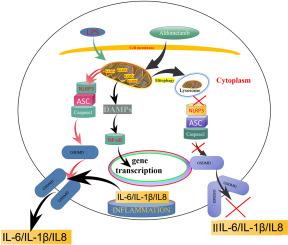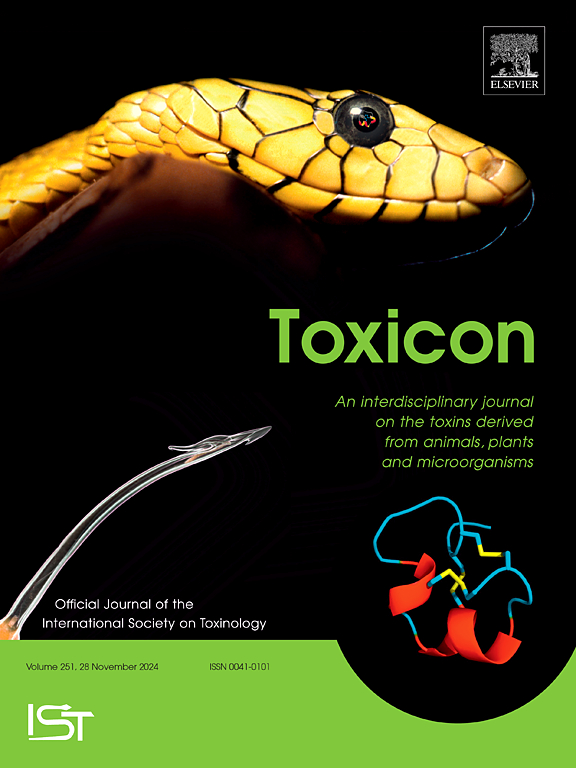Aldometanib通过激活ampk介导的信号通路减轻lps诱导的肺成纤维细胞损伤。
IF 2.4
4区 医学
Q2 PHARMACOLOGY & PHARMACY
引用次数: 0
摘要
急性肺损伤是一种严重破坏肺部气体交换的危重疾病,可能导致呼吸和多器官衰竭。这种情况通常由感染等多种因素引起,对患者的健康和生命构成严重威胁,需要及时诊断和治疗。作为一种新的AMPK (amp活化蛋白激酶)激活剂,“Aldometanib”通过阻断醛缩酶与果糖-1,6-二磷酸(FBP)的结合特异性激活溶酶体AMPK,从而模拟饥饿和热量限制的作用。AMPK对调节细胞代谢和维持体内能量平衡至关重要。本研究评估了aldometanib对脂多糖(LPS)诱导的肺成纤维细胞损伤的影响。因此,我们建立了lps处理的肺成纤维细胞细胞损伤模型。实验结果表明,通过评价细胞增殖标记分子,aldometanib可以有效改善LPS引起的肺成纤维细胞的增殖抑制。随后的研究表明,aldometanib可以有效减轻LPS引起的炎症和氧化应激损伤。我们还发现aldometanib可以抑制nlrp3介导的焦亡。机制研究发现Aldometanib通过激活AMPK信号通路减轻lps诱导的肺成纤维细胞损伤。这一发现为治疗肺部炎症性疾病引入了一个新的药理靶点,并扩大了AMPK激活剂在肺部健康中的潜在应用。本文章由计算机程序翻译,如有差异,请以英文原文为准。

Aldometanib mitigates LPS-induced lung fibroblasts injury through the activation of AMPK-mediated signaling pathways
Acute lung injury is a critical condition that severely disrupts pulmonary gas exchange, potentially causing respiratory and multiple organ failure.This condition is usually caused by various factors such as infection, which poses a serious threat to the health and life of patients and requires timely diagnosis and treatment. As a new AMPK (AMP-activated protein kinase) activator, "Aldometanib" specifically activates lysosomal AMPK by blocking the binding of aldolase to fructose-1,6-diphosphate (FBP), thereby mimicking the effects of starvation and caloric restriction. AMPK is crucial for regulating cellular metabolism and maintaining energy balance in the body. This study assessed aldometanib's impact on lung fibroblasts injury induced by Lipopolysaccharide (LPS). Therefore, we established a cell injury model of LPS-treated lung fibroblasts. The experimental results showed that aldometanib could effectively improve the proliferation inhibition of lung fibroblasts caused by LPS by evaluating cell proliferation marker molecules. Subsequent research demonstrated that aldometanib effectively mitigates inflammation and oxidative stress damage induced by LPS. We also found that aldometanib can inhibit NLRP3-mediated pyroptosis. Mechanistic study found that Aldometanib mitigates LPS-induced lung fibroblasts injury through activation of the AMPK signaling pathway. This finding introduces a novel pharmacological target for treating pulmonary inflammatory diseases and expands the potential use of AMPK activators in lung health.
求助全文
通过发布文献求助,成功后即可免费获取论文全文。
去求助
来源期刊

Toxicon
医学-毒理学
CiteScore
4.80
自引率
10.70%
发文量
358
审稿时长
68 days
期刊介绍:
Toxicon has an open access mirror Toxicon: X, sharing the same aims and scope, editorial team, submission system and rigorous peer review. An introductory offer Toxicon: X - full waiver of the Open Access fee.
Toxicon''s "aims and scope" are to publish:
-articles containing the results of original research on problems related to toxins derived from animals, plants and microorganisms
-papers on novel findings related to the chemical, pharmacological, toxicological, and immunological properties of natural toxins
-molecular biological studies of toxins and other genes from poisonous and venomous organisms that advance understanding of the role or function of toxins
-clinical observations on poisoning and envenoming where a new therapeutic principle has been proposed or a decidedly superior clinical result has been obtained.
-material on the use of toxins as tools in studying biological processes and material on subjects related to venom and antivenom problems.
-articles on the translational application of toxins, for example as drugs and insecticides
-epidemiological studies on envenoming or poisoning, so long as they highlight a previously unrecognised medical problem or provide insight into the prevention or medical treatment of envenoming or poisoning. Retrospective surveys of hospital records, especially those lacking species identification, will not be considered for publication. Properly designed prospective community-based surveys are strongly encouraged.
-articles describing well-known activities of venoms, such as antibacterial, anticancer, and analgesic activities of arachnid venoms, without any attempt to define the mechanism of action or purify the active component, will not be considered for publication in Toxicon.
-review articles on problems related to toxinology.
To encourage the exchange of ideas, sections of the journal may be devoted to Short Communications, Letters to the Editor and activities of the affiliated societies.
 求助内容:
求助内容: 应助结果提醒方式:
应助结果提醒方式:


